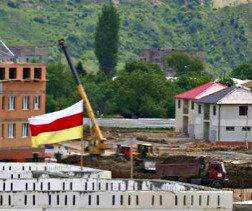
TBILISI, DFWatch–The Interior Ministry in Georgia Monday confirmed that Russian soldiers have moved the de facto border with South Ossetia 200 to 300 meters and is planning to raise the issue at the next meeting of the Incident Prevention and Response Mechanism (IPRM).
Spokesman for the Ministry’s department for analysis Kakhaber Kemoklidze Monday confirmed what media had already reported about moving the border.
Since the Russia-Georgia war in August, 2008, the de facto border between Georgia and the area controlled by Russia has been along the old Soviet border, the so-called administrative border, which stretches further then where the delineation ran before the 2008 war. The de facto border has been moved from time to time by Russia, which has caused some degree of tension.
This latest border-moving will be one of the main topics of the next IPRM meeting.
Georgian media reported on Monday that Russian soldiers moved the border close to the villages Ditsi and Dvani, which lie in a hilly area south west of Tskhinvali.
Russian soldiers have been installing border buildings close to the village Ditsi, in the Gori region, since Monday morning.
According to locals, Russian solders have installed wires in this area before too, but now they are building official-looking concrete buildings at the perimeter. People in Ditsi claim that the new border line created by Russian soldiers is really close to their agricultural lands and strongly restricts free movement in their own lands.
Zurab Chkheidze, Governor of Shida Kartli region, called on the Georgian government to use all possible levers, including relations with the international community, to stop such developments of events.
Kakhaber Kemoklidze from the Interior Ministry says that the ministry does everything to inform the international community and partner countries about what is happening.
Foreign Affairs Minister Maia Panjikidze, on Monday told journalists that the ministry will send a note of protest to the Russian Federation through the Swiss embassy and this issue will also be raised at the next round of Geneva talks. The minister will also discuss this issue at a meeting with foreign diplomats next week.
According to Panjikidze, Zurab Abashidze, The PM’s special representative for relations with Russia, and Gregory Karasin, Russia’s representative in talks with Georgia, will discuss the issue at their next meeting, which is scheduled for June 5.
But Abashidze told journalist that he will not discuss the latest border problems with Karasin, in order not to ‘duplicate’ what is happening at the Geneva talks.
“We will discuss trade relations, the transport issue and the humanitarian-cultural field,” Abashidze said.
Georgia currently has three channels of communication with the breakaway territory’s representatives: The Incident Prevention and Response Mechanism, which is a regular meeting in the field between operative commanders, hosted by the EU’s field observer corps, the EUMM; secondly, the Geneva talks, which are held a few times a year between all the warring parties from 2008; and thirdly, the direct talks between Abashidze and Karasin, a new channel of dialogue established by the Ivanishvili government, for talks directly with Russia, which controls both breakaway regions militarily.

